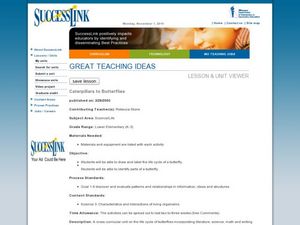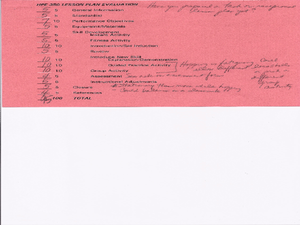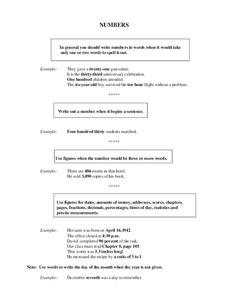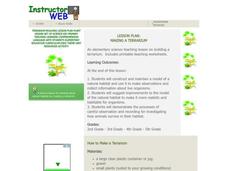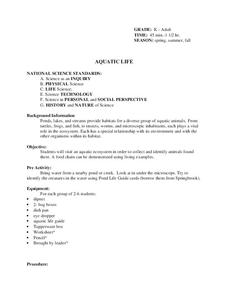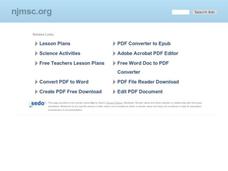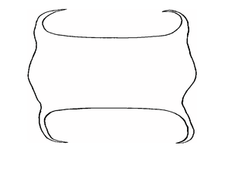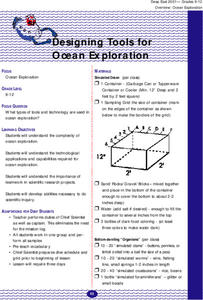Curated OER
"Caterpillars to Butterflies"
Students participate in a variety of activities about how caterpillers become butterflies.
Curated OER
Problem Solving
Students use hockey sticks to pick up bean bags and put them into hoops which they get money for in the end. In this movement and math lesson plan, students get fake money and add up how much they earned in the end based on how many...
Curated OER
Hopping
Students practice hopping. In this physical education lesson, students discuss safety rules and respect for others while exercising. They practice how to hop and play Hop Freeze Tag.
Curated OER
Facts on Fish Species
Here is a brief outline of facts on various Chesapeake Bay fish species. Use it as an example of what kind of information you want your life science learners to collect when you assign them a specific species to research. Another way to...
National External Diploma Program Council
Numbers
The written form for 345 is three-hundred forty-five, where as the word form for 70% is seventy percent. Here, young mathematicians read 10 sentences and write the word form of each number in the sentences.
Curated OER
Making a Terrarium
Students construct and maintain model of natural habitat, suggest improvements to the model of the natural habitat to make it more realistic and habitable, and demonstrate careful observation and recording of how animals survive in their...
Curated OER
Icky "I"
Students recognize the short vowel i in written and spoken language. Through matching and listening activities, they discriminate the short vowel /i/ from other phonemes. Students associate the phoneme with its letter representation and...
Curated OER
Reading - Glaciers
In this online interactive glaciers worksheet, students respond to 10 fill in the blank and multiple choice questions regarding the information included in the provided paragraphs.
Curated OER
A Tail to Tell
Young scholars observe populations of Lumbriculus to discover some of the adaptations that allow them to live successfully along the shores of ponds and marshes. They also design and perform experiments to test proposed hypotheses for...
Curated OER
Ocean Exploration
Students explore a simulated ocean floor. For this environmental lesson plan, students take on roles of an ocean dive team exploring the ocean floor. Dive logs will be created and the students will explore their sections of simulated...
Curated OER
How Big is a Foot?
First graders practice nonstandard measurement and estimating and measuring lengths of objects.
Curated OER
Edible Soil
Students examine the components of the soil in their community. Following directions, they create their own edible soil to be eaten at the end of the activity. They discuss what makes soils around the world different from those found...
Curated OER
What Structures and Behaviours Can Be Observed in Vinegar Eels?
Students view vinegar eels under a microscope at different magnifications. They use a DigiScope with the camera attachment in place of the eyepiece. Students count the number of thrashing movements in 10 seconds. They repeat this three...
Curated OER
Edible Soil
Learners model the soils layers using Oreo's. In this lesson students use their favorite food items to create a model of soil layers. A discovery lesson from a youth camp is adapted for classroom modeling and discussion of soil...
Curated OER
Identifying Figurative Language
In this figurative language worksheet, students identify figurative language in the sentences and explain their answers. Students complete 10 problems.
Curated OER
Aquatic Life
Students explore aquatic life. For this science lesson, students visit an aquatic ecosystem and collect animals found there. Students create a food chain for the aquatic ecosystem.
Curated OER
Ice Fishing
In this reading comprehension worksheet, students read a passage about ice fishing. They then answer the 10 questions on the page.
Curated OER
Fish
This short activity, with a reading passage and questions, could be part of a test preparation activity. Through answering the 10 questions students practice comprehension and vocabulary skills.
Curated OER
Think Green
Students experience and practice compositing and recycling through hands-on-activities. They distinguish between which items from their trash can be recycled, composted and reused. The process for making recycled paper is also covered in...
Curated OER
Skates
Students gain understanding of structure, characteristics, and basic needs of living things and their role in world, identify parts of skate, observe details of skate's body and skate egg case, and identify unique characteristics of skates.
Curated OER
Designing Tools for Ocean Exploration
Students research the methods and tools used in ocean exploration. They, in groups, simulate an ocean exploration and consider what tools facilitate the exploration's objectives.
Curated OER
The Search for Housing Pagurus hirsutiusculus= hermit crab
Students collect snail shells, measure and record their lengths and if they are occupied by a hermit crab. They discover if their is a size difference between occupied and unoccupied shells.
